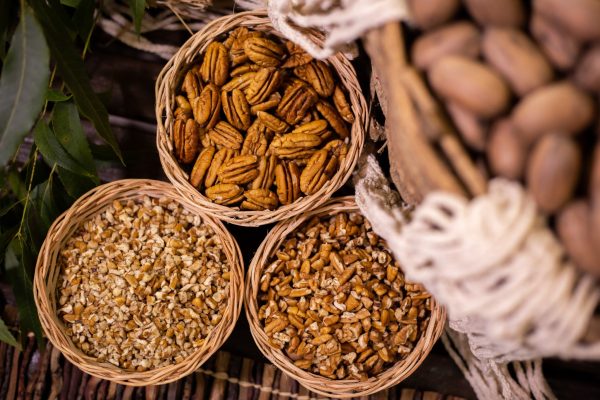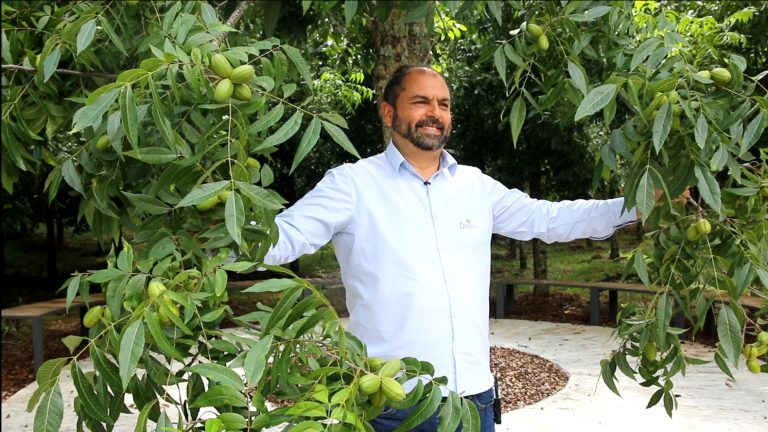São Paulo – Brazilian pecans are arriving in Egypt and Saudi Arabia. Divinut, a nut producer based in Cachoeira do Sul, in the Brazilian Southern state of Rio Grande do Sul, shipped 18.6 tonnes of pecans to the Saudis in November last year and, in late December, exported 21 tonnes to the Egyptians.

The CEO and founder of Divinut, Edson Ortiz (pictured above), told ANBA that the first shipment to Saudi Arabia is expected to arrive at the Port of Jeddah in the next few days. “These were the first shipments we made with packaging in Arabic, and we hope to continue these sales that could evolve into a lasting relationship,” said Ortiz.
He also participated in an international nut show in Dubai in 2022. “We were very excited about the market prospect. We sent samples and have negotiations underway with some buyers in the UAE and other countries in the region, such as Kuwait and Qatar,” he said.
Divinut buys, shells, and picks pecans and sells them to the domestic market, wholesalers, and food industries. “We are now starting our first deal with a retail store,” said Ortiz.
Exports represent around 50% of total production, and the first foreign customer was in Spain, followed recently by the two Arab countries. However, Ortiz wants international sales to expand to 70% by 2024 and continue growing.

He believes in the growth of the pecan market in Arab countries, which already have a culture of consuming dried fruits and nuts. Furthermore, he notes a global trend in the search for healthy foods.
The CEO stated that he designed the company to specialize in pecans for export, aiming for the long term. The first international negotiations began in 2017 through a trading company and direct shipments to Spain in early 2022. “There were ten containers, approximately USD 2 million in exports,” Ortiz said. The first container for Canada could be shipped this January.
The company’s international endeavor began in Europe and now aims towards the Middle East, Africa, and Asia. “We look forward to exporting to Singapore, Indonesia, China, and India. China is the world’s biggest pecan import market,” he said.

The plant was expanded last year and started shelling 30 to 40 tonnes of nuts a day. It is now the largest pecan-processing plant in the Southern Hemisphere. Around 500 to 1,200 tonnes are processed yearly at the Divinut factory. Half this volume is shells, hence, the peeled product amounts to around 250 to 600 tonnes. This volume is expected to grow with the expansion in the coming years.
The pecan tree is native to the Southern United States and Northern Mexico and has adapted well to the South and Southeast of Brazil, according to Ortiz. Today, Brazil is fourth among the world’s largest pecan producers, behind the USA, Mexico, and South Africa. “USA and Mexico produce 91% of the total. South Africa exports a lot to China, and as it is close, they don’t peel it,” he explained.
In 2023, Brazil produced 4,500 tonnes of pecans. Worldwide output tallied 311,000 tonnes last year. Data is from the International Nut and Dried Fruit Council (INC). “Solely China purchased around 50,000 tonnes,” said Ortiz.

Established in 2000, the company has the world’s largest pecan tree nursery. “We produce and sell genetically selected seedlings to small producers with a production purchase guarantee. Currently, we have over 4,000 producers in the South and Southeast in a circular economy. They are our customers and suppliers,” said Ortiz.
According to him, Divinut operates with 100% renewable energy. “We have all electrical power generated by photovoltaic plants and all water and air heating energy using biomass and waste. We also have rainwater reservoirs and use walnut shells to heat air and water, as organic substrates and sell them as antioxidant tea, and ship blasting input, among other purposes. As a byproduct, it has some commercial value,” he declared.
Contact
Translated by Elúsio Brasileiro




